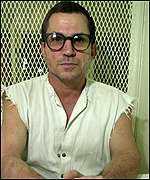|

 Court
to Hear Appeal From Texas Death Row Inmate Court
to Hear Appeal From Texas Death Row Inmate
By
DAVID STOUT
WASHINGTON,
Nov. 27 The Supreme Court agreed today to hear anappeal from a
condemned killer from Texas whose lawyers say he hasthe mental
powers of a grade-school boy.In so doing, the Court granted the
killer, Johnny Paul Penry, atleast several more months of life.
The justices also indirectlycast a spotlight on a legal and moral
issue that continues todominate American law.In granting certiori
in Penry v. Johnson, 00-6677, the high courtagreed to use the case
to clarify how much chance the jurors indeath-penalty cases must
be given to consider a defendant's mentalcapabilities. The
defendant's lawyers maintain that Mr. Penrysuffered horrific child
abuse at the hands of his mother, who wasmentally ill.In 1979,
less than three months after he was paroled from prisonafter
serving a term for rape, he forced his way into the home ofPamela
Moseley Carpenter, a 22-year-old housewife, in Livingston,Tex. He
raped her and stabbed her to death with a pair of scissorsshe had
been using to make Halloween decorations.In 1989, the Supreme
Court overturned his conviction in Mrs.Carpenter's slaying,
holding that the sentencing jury had not beenproperly allowed to
take his mental powers into account. But thejustices also decided
that the Constitution does not bar theexecution of mentally
retarded killers.Mr. Penry was retried, convicted again and
re-sentenced to death ayear later. His lawyers again appealed,
arguing that the jury wasnot given enough opportunity to weigh the
defendant's mentalcapabilities. A federal appeals court upheld
that conviction lastJune.Mr. Penry was hours away from being put
to death on Nov. 16, whenthe Supreme Court granted a stay of
execution while it consideredwhether to take his appeal. With
today's decision to do just that,the justices in effect almost
surely granted the defendant at leastseveral more months of
life.The high court does not often intervene at the last minute
indeath penalty cases. So its decision to do so in this case
couldindicate that it sees substantial issues.Although the Supreme
Court declared in 1976 that capitalpunishment is not
unconstitutional in and of itself, the debateabout its morality
goes on. And while the case of Johnny Paul Penry has gained more
attentionthan many death penalty cases, it is typical at its core.
Anyonewho has seriously studied capital punishment knows that many
of themen on death row are slow-witted and suffered terribly in
theirchildhoods. Nor is there any doubt about the suffering of
their victims. Mrs.Carpenter's parents have waited for two decades
for the closurethat they think Mr. Penry's execution will bring
them. "This iskilling my mom and dad," the victim's
brother, Mark Moseley, formerplace-kicker for the Washington
Redskins, said after the stay ofexecution was granted.

Disabled Texan wins death row delay
Texas: Record number of executions
The
United States Supreme Court will hear an appeal against the
scheduled execution of a mentally disabled man in Texas who is
said to have the reasoning capacity of a seven-year-old.
The
court said it will use the case of 44-year-old Johnny Paul Penry
to clarify how much flexibility jurors in death penalty trials
will be allowed to consider the defendant's mental ability.
Mr
Penry was convicted of the rape and murder of Pamela Carpenter in
1979.
The
Supreme Court halted his execution earlier this month just hours
before he was due to die.
Thirty-nine
people have been executed so far this year in Texas, the state
governed by Republican presidential candidate George W Bush,
nearly four times as many as any other American state.
International
campaign
Mr
Penry's supporters have said he has the mental understanding of a
child. Prosecutors insist he is a sociopath pretending to be
retarded.
Mr
Penry is believed to have an IQ between 50 and 63, which is below
the 70 required for normal intelligence, and has said, according
to his lawyers, he still believes in Father Christmas.
Groups
including the human rights organisation, Amnesty International,
and the American Association on Mental Retardation have taken up
his case, along with a mass-circulation British newspaper and
German parliamentary leaders.
Texas
record
The
tally for executions in Texas this year is the highest in any US
state since records began in 1930. Texas also held the previous
record of 37 executions in a year.
This
is the second time the Supreme Court will consider Mr Penry's
case.
In
1989, the court ruled that juries in capital murder trials must be
allowed to weigh evidence of mental retardation. It also ruled
that executing the mentally retarded does not violate the
constitutional ban on cruel and unusual punishment.
In
its 1989 ruling, the Supreme Court, threw out Mr Penry's
conviction and ordered a new trial.
He
was retried, convicted and again sentenced to death in 1990.
The Supreme Court justices will hear arguments in Mr
Penry's latest appeal next year. A decision is due by the end of
June 2001.
|

